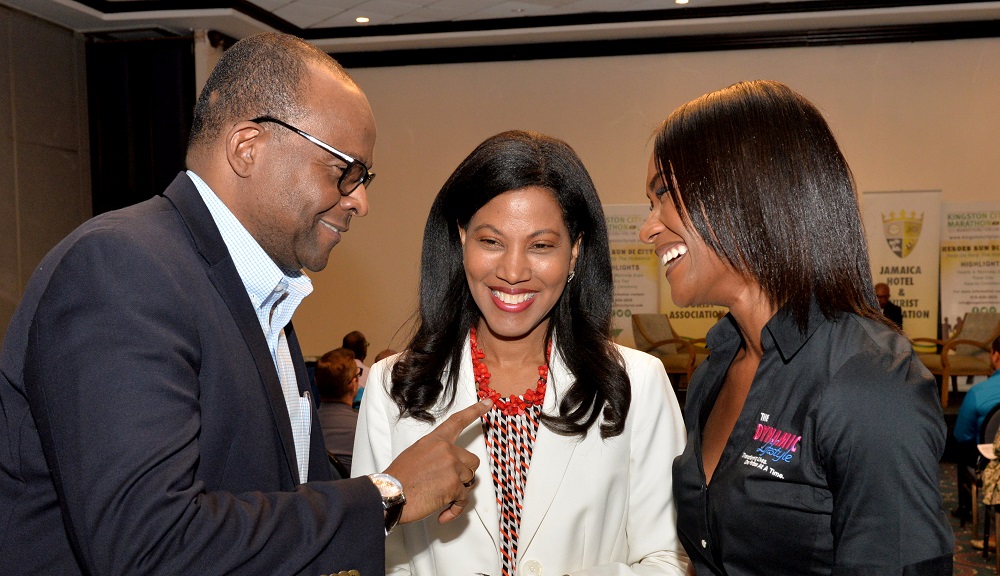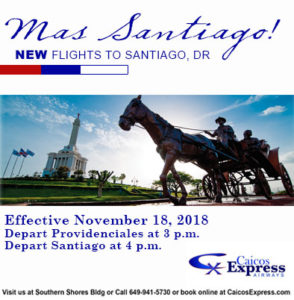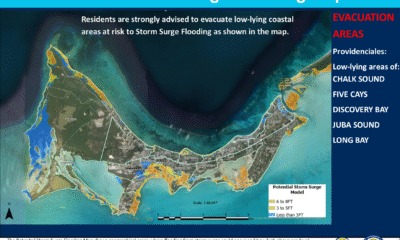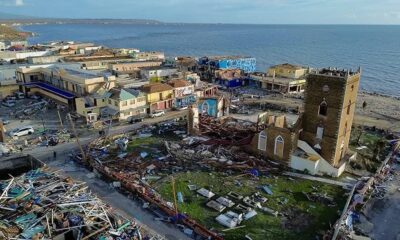Caribbean News
JAMAICA: Tourism Director hails marathon as part of Kingston City Run
Published
7 years agoon

#Kingston, October 25, 2018 – Jamaica – Tourism Director, Donovan White, has lauded the organisers of the annual Kingston City Run for expanding the slate of activities for the seventh staging in 2019 to include a marathon, noting that this has the potential to attract visitors to the capital city.
 The three-day run, organised by the Jamaica Hotel and Tourist Association’s (JHTA) Kingston Chapter, is slated for March 15 to 17.
The three-day run, organised by the Jamaica Hotel and Tourist Association’s (JHTA) Kingston Chapter, is slated for March 15 to 17.
Speaking during the recent launch at The Jamaica Pegasus hotel in New Kingston, Mr. White said Kingston is “well deserving” of becoming part of the global trend that sees people travelling to “experience what it’s like to run in a marathon. I think that’s the experience that makes the transition of [the] Kingston City Run to [include a] marathon, a really bold move by the organisers,” he noted.
Mr. White described the event’s introduction as a “fantastic development” for the country and wider Caribbean, “because I believe Jamaica has a leadership role to play in the business of driving this region of the world forward”. He argued that running continues to emerge as “a way of life for a lot of people in a lot of places… people [who] we would like to show [more of] Jamaica [to]”.
Noting the success of the annual Reggae Marathon in Negril, which, he said, has gained a “really good positon” globally over the years since its inception, Mr. White contended that Kingston is equally deserving of being a “part of the experience of, not just running, but meeting new people, making friends, and creating a lifetime of memories”.
He added that Jamaica, particularly the capital city, “needs to have something like this that becomes part of [the] flagship of our tourism product for the destination of Kingston”.
“What it means is that runners… from all over the world [will] get an opportunity to spend two or three days in Kingston and, maybe, get an opportunity to see that Kingston is just as beautiful… or even more beautiful than some other places [globally] that they have been to run,” he said.
The City Run/Marathon, staged since 2013, aims to raise funds to support projects for Kingston’s homeless, vulnerable youth through partner charity organisations, and heighten awareness of the capital city as a tourist destination.
Proceeds from the event will go towards the Open Arms Drop-In Centre; Marie Atkins Night Shelter; Food For the Poor; Alpha Institute (Alpha Boys’ Home); and Missionaries of the Poor.
In addition to the marathon, it includes a half marathon, 10k race, 5k run/walk, and a kids run, the latter of which will involve youngsters from inner-city communities as part of the organisers’ focus on inclusive participation.
The weekend of events also includes a welcome party for race participants and other stakeholders on Friday, March 15; a lifestyle and fitness expo on Saturday, March 16; with five and 10k races and marathons set for March 17. The activities will culminate with an awards ceremony and finish line reggae festival on March 17.
 For her part, Kingston City Run founder and Organising Committee Co-Chair, Nicola Madden-Greig, noted that a number of great cities around the world host marathons, adding that “we think [Kingston is] a great city, and we should definitely have a great marathon”.
For her part, Kingston City Run founder and Organising Committee Co-Chair, Nicola Madden-Greig, noted that a number of great cities around the world host marathons, adding that “we think [Kingston is] a great city, and we should definitely have a great marathon”.
“We want to put Kingston on the map and really celebrate all that is wonderful about our capital city. Kingston is where it all happens. We are the heartbeat of Jamaica, and we definitely will be celebrating all of this, come March 2019… so we are very excited,” she said.
Mrs. Madden-Greig advised that all races will start and end at Emancipation Park in New Kingston.
Participants will traverse scenic routes that take them past notable and historic landmarks such as Devon House, King’s House, Bob Marley Museum, and Hope Gardens.
Mrs. Madden-Greig indicated that the courses were measured by the International Association of Athletics Federation/Association of International Marathons and Distance Races (IAAF/AIMS) International Measurement Administrator for the Americas and ‘A’ class measurer, Bernie Conway, and have been ratified in keeping with IAAF global standards.
The Co-Chair informed that the organising committee has forged a strategic partnership with Active.com, one of the largest race registration and marathon promoters globally, which will be responsible for all Kingston City Run/Kingston Marathon registrations and marketing.
“We will also be working with the Jamaica Tourist Board (JTB), and will be facilitating a series of launches through JTB’s partnership in various locations… including New York, Florida, Toronto, and London. We already participated in Jamaica Product Exchange (JAPEX) in September and that was where we really pushed out to our international tour operators and travel agents,” she said.
Additionally, Mrs. Madden-Greig said the Committee has partnered with Dynamic Lifestyles Chief Executive Officer, avid road-race runner and wife of the Tourism Director, Patrice White, who will officially serve as the event’s Ambassador.
“Patrice is going to [in her role as] an international ambassador push the word out locally and internationally. We are very excited and pleased to have Patrice on board,” she said, while indicating that further details on the event will be announced in January 2019.
Mrs. Madden-Greig encouraged stakeholders to “work with us [as] this is long-term vision for our city.” She particularly urged them to support participants in the kiddies run.
“Last year, we were able to have just over 500 children on the road. These were sponsored kids’ teams. So you can sponsor a team of, like, 59 children and you can brand them… put them in nice little shirts. You fully sponsor their  registration… we pick them up for you… [and] we feed them… give them a nice breakfast… [so] inner-city kids get to enjoy this event,” she said.
registration… we pick them up for you… [and] we feed them… give them a nice breakfast… [so] inner-city kids get to enjoy this event,” she said.
The Co-Chair indicated that “this is something that we are trying to inculcate, in terms of building a culture of running… [by] allowing them to enjoy an event, celebrating the city in which they live”.
“It is going to be a ramped up effort to really secure our place in the marathon space and in the space of distance running races worldwide. We really want you [our stakeholders, especially sponsors] to dig deep and invest in this. Don’t think of it as a sponsorship, but as an investment in your city and how we can really grow this,” Mrs. Madden-Greig added.
Main sponsors of the event, which had just under 5,000 participants last year, are the JHTA, JTB, Kingston and St. Andrew Municipal Corporation (KSAMC), Norman Manley International Airport (NMIA), RJR/Gleaner Communications Group, and Marksman Limited.
Release: JIS
Contact: Douglas McIntosh
Photo Caption: Tourism Director, Donovan White (left), shares a light moment with Founder and Organising Committee Co-Chair, Kingston City Run/Kingston Marathon, Nicola Madden-Greig (centre); and the event’s Ambassador, Patrice White, during the recent launch at The Jamaica Pegasus, New Kingston. The annual event is slated for March 15 to 17, 2019.
Dave Reid Photo
You may like
Caribbean News
Seven Days. Seven Nations. One Storm — Hurricane Melissa
Published
5 days agoon
November 1, 2025
A week of wind, water, and heartbreak
From Haiti’s hillsides to Bermuda’s reefs, seven Caribbean nations have been battered, bruised, and forever marked by Hurricane Melissa — a storm that tested not only the region’s infrastructure but its unshakable spirit of unity.
Saturday–Sunday, October 25–26 – The First Strike: Hispaniola
Before the storm even earned its name, torrential rain and flash floods swept across Haiti and the Dominican Republic, claiming lives and tearing through rural communities.
tearing through rural communities.
In southern Haiti, rivers burst their banks, swallowing roads and homes; 23 people were confirmed dead by Sunday evening. Across the border, one death was reported in the Dominican Republic as swollen rivers cut off villages in Barahona and Pedernales.
By nightfall, the tropical system had strengthened — and the Caribbean knew it was facing something historic.
Monday, October 27 – Evacuations and Airlifts
In The Bahamas, Prime Minister Philip Davis issued a mandatory evacuation for the MICAL Islands — Mayaguana, Inagua, Crooked Island, Acklins, Long Cay, and Ragged Island.
Bahamasair added extra flights as the nation braced for what forecasters warned could become the strongest storm in nearly two decades.
Meanwhile, Jamaica, Turks & Caicos, and Cuba activated their national emergency operations centers.
Tuesday, October 28 – Jamaica and Haiti Hit Hard
By afternoon, Hurricane Melissa made landfall near St Elizabeth, Jamaica, as a Category 5 hurricane — winds of 185 mph, central pressure 892 mb, the lowest ever recorded so close to the island.
Roads collapsed, bridges washed away, and Black River Hospital lost its roof. Power failed for 72 percent of the island.
BOJ TV footage shows split asphalt, sparking lines, and flooded communities abandoned for safety.
Initially four were reported dead, that grew to seven deaths and heavy damage in 170 communities; Andrew Holness, Jamaican Prime Minister calling it “a national test of resilience.”
Haiti, still recovering from the weekend’s flooding, was hit again as outer bands dumped more rain on Les Cayes and Jacmel, deepening the humanitarian crisis.
Wednesday, October 29 – Crossing to Cuba
Weakened slightly to Category 4 (145 mph), Melissa tracked north-northeast at 8 mph, hammering eastern Cuba with hurricane-force winds
and mudslides. Over 15 000 people were evacuated from Santiago de Cuba and Holguín.
In Turks & Caicos, the Regiment deployed to Grand Turk, Salt Cay, South, North and Middle Caicos, preparing shelters and securing public buildings.
Thursday, October 30 – The Bahamas and the All Clear
Melissa’s speed increased, sparing the northern Caribbean its worst.
The Bahamas Airport Authority closed 13 airports from Mayaguana to Exuma International; none reported casualties, though infrastructure suffered.
In Turks & Caicos, the all-clear came early Thursday after minimal impact. Premier Washington Misick expressed gratitude and pledged support for neighbors:
“We must act — not only with words, but with compassion and deeds.”
Friday, October 31 – Counting the Cost
By Friday, Melissa had weakened to Category 3 (120 mph) north of Cuba.
The Bahamas Department of Meteorology issued its final alert, lifting warnings for the southern islands.
Regional toll:
- Haiti: 23 dead, thousands displaced.
- Jamaica: 7 dead, 170 communities damaged; 72% without electricity
- Cuba: 2 dead, 15, 000 evacuated.
- Dominican Republic: 1 dead, flooding in southwest.
- Bahamas: 0 dead, minor infrastructure damage and flooding in southeast.
- Turks & Caicos: minimal to no impact.
Relief and Reconnection
The Cayman Islands became the first government to touch down in Jamaica post-storm. Premier Juliana O’Connor-Connolly led a contingent bringing a plane-load of essentials and pledged US $1.2 million in aid.
Reggae icon Shaggy arrived on a private jet with friends, delivering food, medical kits, and hygiene supplies.
Meanwhile, Starlink and FLOW Jamaica activated emergency satellite internet across Jamaica providing free connectivity through November.
From overseas, U.S. President Donald Trump, speaking during his Asia tour, announced that American search-and-rescue teams and disaster aid will support the region.
“They can depend on U.S. assistance as they recover from this historic storm,” he said.
Faith, Funds, and False Websites
The Government of Jamaica and the Sandals Foundation have both launched verified donation portals for recovery. Officials are warning against fake crowdfunding pages posing as relief sites and urging donors to use only official channels.
A Seventh Nation in the Crosshairs – Bermuda
As Hurricane Melissa left the Caribbean basin, Bermuda found itself next in line.
Forecasts indicated the storm would pass just west of the island late Thursday into Friday, likely as a Category 1 to 2 hurricane with sustained winds near 105 mph.
Though far weaker than when it ravaged Jamaica, officials issued a hurricane warning, urging residents to secure property and expect tropical-storm conditions.
By all appearances Bermuda is heeding the warnings
The Human Response
Across the Caribbean, solidarity surged.
The Global Empowerment Mission (GEM) in Miami began airlifting relief supplies, while churches, civic groups, and businesses in The Bahamas and Turks & Caicos organized drives for displaced families.
“Your dedication gave our islands the strength to face the storm,” Premier Misick said. “Together, as one Caribbean family, we will rise stronger.”
Resilience in the Wake
Melissa’s winds may have faded, but her impact endures. Engineers are inspecting bridges, hillsides, and water systems; volunteers are clearing debris and distributing aid in communities still cut off.
From Haiti’s ravaged river valleys to Jamaica’s sugar towns, from Cuba’s eastern hills to The Bahamas’ salt ponds and Bermuda’s reefs, the region once again stands at the crossroads of ruin and renewal — and leans, as always, toward hope and a faithful God
Caribbean News
Haitian Pushback Halts Controversial Constitution Rewrite — What’s Next?
Published
3 weeks agoon
October 15, 2025
Deandrea Hamilton | Editor
Haitian media, legal scholars and civic voices did what bullets and barricades couldn’t: they stopped a sweeping constitutional overhaul widely branded as anti-democratic. Editorials and analyses tore into proposals to abolish the Senate, scrap the prime minister, shift to one-round presidential elections, expand presidential power, and open high office to dual-nationals—a package critics said would hard-wire dominance into the executive at a moment of near-lawless insecurity.
The Venice Commission—Europe’s top constitutional advisory body—didn’t mince words either. In a formal opinion requested by Haiti’s provisional electoral authorities, it pressed for clear legal safeguards and credible conditions before any referendum, including measures to prevent gang interference in the electoral process—an implicit rebuke of pushing a foundational rewrite amid a security collapse.
Facing that drumbeat, Haiti’s Transitional Presidential Council has now formally ended the constitutional-reform initiative. The decision, taken at a Council of Ministers meeting at the National Palace, effectively aborts the rewrite track that has haunted Haiti since the Moïse and Henry eras.
So what now? Per the Miami Herald, the pivot is back to basics: security first, elections next. That means stabilizing Port-au-Prince enough to run a vote, rebuilding the electoral timetable, and empowering the provisional electoral machinery—none of which is simple when gangs control vast chunks of the capital and state authority remains fragile. Recent headlines underline the risk: gunfire has disrupted top-level government meetings, a visceral reminder that constitutional theory means little without territorial control.
Bottom line: Haitian journalists and public intellectuals helped slam the brakes on a high-stakes centralization of power that lacked legitimacy and safe conditions. International constitutional experts added weight, and the transition authorities finally conceded reality. Now the fight shifts to making an election possible—clean rolls, secure polling, and credible oversight—under circumstances that are still hostile to democracy. If the state can’t guarantee basic safety, any ballot is theater. If it can, shelving the rewrite may prove the first real step back toward consent of the governed.
Caribbean News
Political Theatre? Caribbean Parliamentarians Walk Out on House Speaker
Published
3 weeks agoon
October 14, 2025
By Deandrea Hamilton | Magnetic Media
October 14, 2025 – It’s being called political theatre — but for citizens, constitutional watchdogs, and democracy advocates across the Caribbean, it feels far more serious. Within a single week, two national parliaments — in Trinidad and Tobago and St. Kitts and Nevis — descended into turmoil as opposition members stormed out in protest, accusing their Speakers of bias, overreach, and abuse of parliamentary procedure.
For observers, the walkouts signal a deeper problem: erosion of trust in the very institutions meant to safeguard democracy. When Speakers are viewed as political enforcers instead of neutral referees, parliaments stop functioning as chambers of debate and start performing as stages for power and spectacle — with citizens left wondering who, if anyone, is still accountable.
October 6: St. Kitts Parliament Erupts
The first walkout erupted in Basseterre on October 6, 2025, when Dr. Timothy Harris, former Prime Minister and now Opposition Leader, led his team out of the St. Kitts and Nevis National Assembly in a protest that stunned the chamber.
led his team out of the St. Kitts and Nevis National Assembly in a protest that stunned the chamber.
The flashpoint came as the Speaker moved to approve more than three years’ worth of unratified parliamentary minutes in one sitting — covering 27 meetings and three national budgets — without individual review or debate.
Dr. Harris called the move “a flagrant breach of the Constitution and parliamentary tradition,” warning that the practice undermines transparency and accountability. “No serious parliament can go years without approving a single set of minutes,” he said after exiting the chamber.
The Speaker defended the decision as administrative housekeeping, but critics were unconvinced, branding the move a “world record disgrace.” The opposition’s walkout triggered renewed calls for the Speaker’s resignation and sparked a wider public discussion about record-keeping, accountability, and respect for parliamentary norms in St. Kitts and Nevis.
October 10: Trinidad Opposition Follows Suit
Four days later, on October 10, 2025, the Opposition United National Congress (UNC) in Trinidad and Tobago staged its own walkout from the House of Representatives in Port of Spain.
The UNC accused the Speaker of partisan bias, claiming she had repeatedly blocked urgent questions, ignored points of order, and allowed government members to breach standing orders without consequence.
“The Speaker has failed in her duty to act impartially,” the Opposition declared in a statement. “Parliament is not the property of any political party or Presiding Officer.”
The dramatic exit was seen as a culmination of months of rising tension and frustration, with opposition MPs arguing that parliamentary rules were being selectively applied to silence dissenting voices.
Political analyst Dr. Marcia Ferdinand described the twin walkouts as “a warning sign that parliamentary democracy in the Caribbean is teetering on the edge of performative politics.”
“When chairs become political shields rather than constitutional referees,” she said, “democracy becomes theatre, not governance.”
A Pattern Emerging
While St. Kitts and Trinidad are very different political environments, both incidents point to the same regional fault line: the perception that Speakers — the guardians of parliamentary order — are no longer impartial.
In Westminster-style systems like those across the Caribbean, the Speaker’s authority depends not on power but on public confidence in fairness. Once that credibility erodes, parliamentary control collapses into confrontation.
Governance experts say the implications are serious: eroded trust between government and opposition, declining public confidence in state institutions, and growing voter cynicism that “rules” are flexible tools of political advantage.
Why It Matters
Parliamentary walkouts are not new in the Caribbean, but what makes these recent events different is their frequency and intensity — and the regional echo they’ve created. Social media has amplified images of lawmakers storming out, with citizens from Barbados to Belize questioning whether the same erosion of decorum could be happening in their own legislatures.
the regional echo they’ve created. Social media has amplified images of lawmakers storming out, with citizens from Barbados to Belize questioning whether the same erosion of decorum could be happening in their own legislatures.
Analysts warn that if this perception takes hold, it risks diminishing the moral authority of parliamentary democracy itself.
“Once opposition MPs believe the rules are rigged, and once citizens believe Parliament is just performance,” said one Caribbean governance researcher, “you’ve lost the most valuable currency in democracy — trust.”
Restoring Balance
Political reformers across the region are calling for tighter Standing Order enforcement, independent parliamentary service commissions, and training to strengthen Speaker neutrality. Civil society leaders say the public must also play its part by demanding transparency and refusing to normalize partisan manipulation of parliamentary procedure.
Whether these twin walkouts become catalysts for reform — or simply another episode of Caribbean political theatre — will depend on what happens next inside those chambers.
For now, democracy watchers agree on one thing: when opposition leaders feel the only way to be heard is to walk out, the entire democratic house — not just its Speaker — is in danger of collapse.
Angle by Deandrea Hamilton. Built with ChatGPT (AI). Magnetic Media — CAPTURING LIFE.










